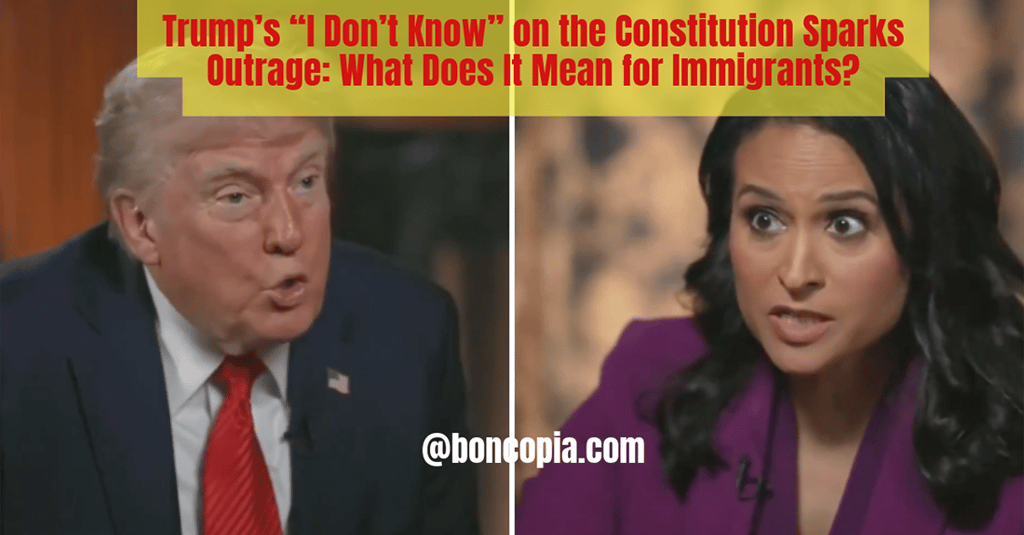Trump’s “I Don’t Know” on the Constitution Sparks Outrage: What Does It Mean for Immigrants?
5/4/20254 min read


Trump’s “I Don’t Know” on the Constitution Sparks Outrage: What Does It Mean for Immigrants?
Posted on Boncopia.com | Immigrant Category | May 5, 2025
A Shocking Statement on "Meet the Press"
On May 4, 2025, President Donald Trump sat down for an interview on NBC’s Meet the Press with host Kristen Welker. What unfolded has sent shockwaves through immigrant communities and legal circles alike. When asked if everyone in the U.S., including non-citizens, deserves due process, Trump replied, “I don’t know. I’m not a lawyer.” Pressed further on whether he needs to uphold the Constitution, he doubled down: “I don’t know.”
This isn’t just a casual remark—it’s a direct challenge to the core principles of the U.S. Constitution, specifically the Fifth Amendment, which guarantees due process for all persons on American soil, not just citizens. For immigrants already facing uncertainty under Trump’s second term, these words hit like a thunderclap.
Why This Matters for Immigrants
Trump’s comments come amid his administration’s aggressive immigration policies. His mass deportation program, which aims to remove millions of undocumented immigrants, has already led to fear in communities across the country. Schools report lower attendance, businesses in immigrant-rich neighborhoods see declining foot traffic, and even international travel to the U.S. has dropped, according to a Migration Policy Institute report from April 27, 2025.
But here’s the kicker: the Fifth Amendment doesn’t bend for political agendas. Legal experts, like Muzaffar Chishti from the Migration Policy Institute, have warned that eroding due process for immigrants sets a “slippery slope” that could eventually impact U.S. citizens. If the government can deport someone without a hearing, how can we be sure they’re targeting the right people? Stories of U.S. citizens being wrongly detained—like Robert Panton, a lawful permanent resident facing removal for a nonviolent drug offense—already highlight the risks.
The Bigger Picture: A Pattern of Disregard
This isn’t the first time Trump has clashed with constitutional norms. In January 2025, he signed an executive order attempting to end birthright citizenship, a right enshrined in the 14th Amendment. The move prompted lawsuits from 18 state attorneys general, who called it “unlawful” and “unconstitutional,” as reported by NPR on January 21, 2025. A federal judge later issued a preliminary injunction, but the message was clear: Trump’s administration is willing to push legal boundaries to achieve its immigration goals.
Now, with his latest comments, Trump appears to be floating the idea of bypassing due process entirely. He complained on Meet the Press that providing due process would require “a million or two million or three million trials,” slowing down his deportation plans. But as the National Immigrant Justice Center warns, tools like “expedited removal”—which allows officers to deport people without a hearing—could expand under Trump, leaving immigrants with little recourse.
What’s at Stake for Immigrant Communities?
For immigrants, the stakes couldn’t be higher. The Department of Homeland Security claims it follows the Constitution, but their actions tell a different story. ICE deportations from the U.S. interior have ticked up to 4,300 per month in February 2025, per NBC, though still far below Trump’s first-term peak. Meanwhile, the administration’s attempts to fire immigration judges and weaken the already strained immigration court system signal a broader effort to dismantle protections, according to an NPR report from April 29, 2025.
Immigrant advocates are fighting back. The ACLU and Democratic attorneys general have filed over 50 lawsuits challenging Trump’s policies as of April 2025. But the rapid pace of these changes has left many struggling to keep up, and the fear in immigrant communities is palpable.
Social Media Erupts: Voices on Both Sides
The Meet the Press interview sparked a firestorm on X. Ed Krassenstein (@EdKrassen) posted on May 4, 2025, calling out Trump’s disregard for the Constitution and noting his violation of a Supreme Court order. Others, like Laurence Boorstein (@LarryBoorstein), reminded readers of the presidential oath: “I do solemnly swear… to preserve, protect, and defend the Constitution.”
On the other side, some supporters argue Trump is prioritizing American citizens.
@RealLifeFootage posted, “President Trump is focused on protecting the American people first… America First means putting citizens before chaos.” But critics like @RepRaskin countered, quoting the oath and warning of the dangers of ignoring constitutional duties.
What Can Immigrants Do?
If you’re an immigrant worried about these developments, you’re not powerless. The National Immigrant Justice Center recommends seeking legal advice only from licensed attorneys or accredited representatives at DOJ-recognized nonprofits. Be skeptical of quick fixes or social media promises of relief—scams targeting vulnerable immigrants are on the rise.
For those in Chicago, the City of Chicago Legal Protection Fund offers free legal services through organizations like NIJC. Knowing your rights, regardless of status, is crucial. As the NIJC states, “All individuals in the United States have rights,” and understanding them can make all the difference.
A Call to Reflect: What’s Next?
Trump’s “I don’t know” isn’t just a gaffe—it’s a window into a mindset that could reshape the lives of millions. As his administration pushes forward with its immigration agenda, the battle over due process and constitutional rights will likely head to the courts. But the real question is: how far will this go before the system pushes back?
For immigrant communities, the uncertainty is a daily reality. For the rest of us, it’s a reminder that the principles of justice and fairness are only as strong as our willingness to defend them. What do you think—can the U.S. balance border security with constitutional rights? How should immigrants prepare for what’s next? And what does this moment mean for the future of democracy? Let’s keep the conversation going.
hello@boncopia.com
+13286036419
© 2025. All rights reserved.